Can Whistler Save Summer Skiing? 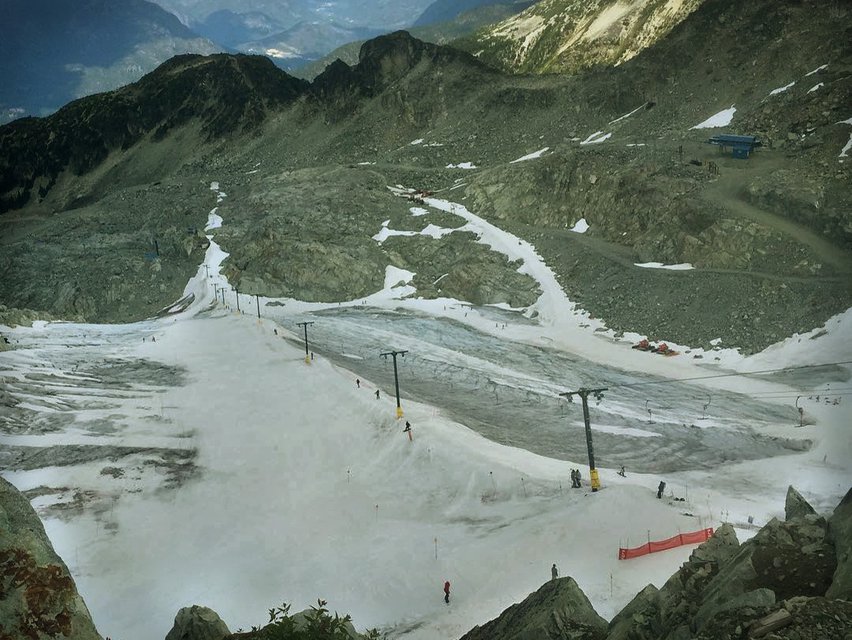
Although the glacier was open as usual this summer the lack of snow was obvious. Photo TinaGeisel
Very few sports rely so heavily on mother nature's helping hand when compared to skiing. In most cases if it's warm and there is no snow we simply cant ski, dry slopes excluded. Technology has helped resorts cope with less natural snow but resorts still need cold temperatures to be able to make artificial snow. Whatever your feelings on Global Warming and Climate change one thing is for sure, if it keeps getting warmer skiers are going to have problems.
It can sometimes be hard to really see the effects of rising temperatures. For the most part the snow keeps falling in the winter and although some places have had problems recently, most resorts are still able to function pretty much as normal. There is however one area where its a little easier to see the effects of rising temperatures, summer skiing.
Summer skiing has been around in North America and Europe for well over 50 years and although it has always been reserved for permanent snow fields or glaciers, the amount of summer skiing has drastically reduced in recent years. Even the once snow sure resorts of Whistler and Mt Hood struggled this past summer and it started to become clear that there was a very strong possibility that summer skiing may unfortunately become a thing of the past.
But just as things looked at their worst Whistler announced a major new plan to try to intervene in the glacier loss by installing snow cannons to help add to the natural snow and hopefully slow down or even stop the retreat of the glacier.
For skiers this was great news. We would hopefully get to continue summer skiing but there were also quite a few concerns raised about how much energy a project like this would actually require. Sure it may be possible to create snow but if that snow is costing more in energy is it really worth it?
It is certainly an ambitious project and I was eager to find out more, so i sat down with Arthur De Jong to find out exactly what they had planned. Arthur is the mountain planning and environmental resource manager for whistler and the man behind the project, so there is no one better to explain what Whistler have planned.
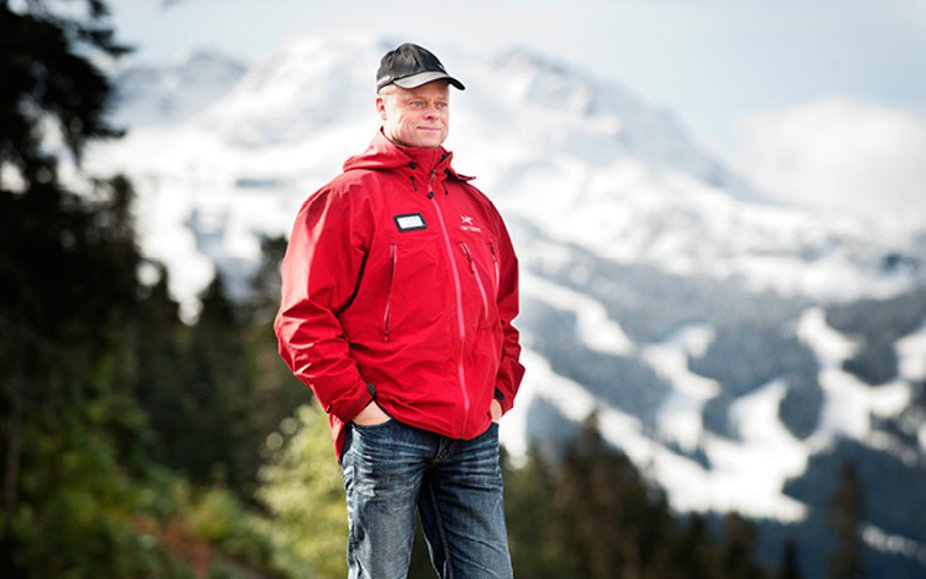
Arthur has worked on Blackcomb mountain for the past 35 years and is now Mountain Planning and Environmental Resource Manager so there are very few people who could better explain the changes going happening on the glacier.
I began by asking Arthur what he had seen changing on the glacier over the years.
Tom: "What have you witnessed on the glacier, has it been noticeable in your time how much it has decreased?"
Arthur: "Well absolutely, it has been losing its mass since the first days that i skied on it in the 80's but that's very consistent with other Glaciers on the South coast. Over the past 100 to 150 years, glaciers are half the size compared to back at that time, so the Horstman's decrease is consistent to what we see in the region."
"Glaciers are one of the most sensitive ecosystems to temperature change, they are really natures thermometer. We have done a lot of studies into glacier mass reduction (specifically on Horstman) and the reason it's loosing snow is not because of less snow, in the last three decades we have in fact had on average more snow, it's instead a result of warmer summer temperatures."
Tom: "Has there been a rise in glacier reduction in the last 5 to 10 years?"
Arthur: "No its actually slowed down. About 6 or 7 years ago there was an acceleration but then we had some big significant snow years (la Nina years) and following this the retreat dramatically slowed down but we certainly had some warnings 6 or 7 years ago. But with the last two winters which have been below average snow years along with drought like summers it puts us (WhistlerBlackcomb) in a situation where if we want to continue to offer summer skiing (which we do) we have to intervene."
"We have studied different approaches in terms of stabilizing mass balance and we concluded snow making is the only means of potentially stabilizing the retreat of the glacier, and I say potentially because this is only a first step."
"To begin we are placing 5 guns at the top of the glacier in the accumulation zone. We have done a lot of analysis on a major snow making plan but we want to test with the 5 guns first."
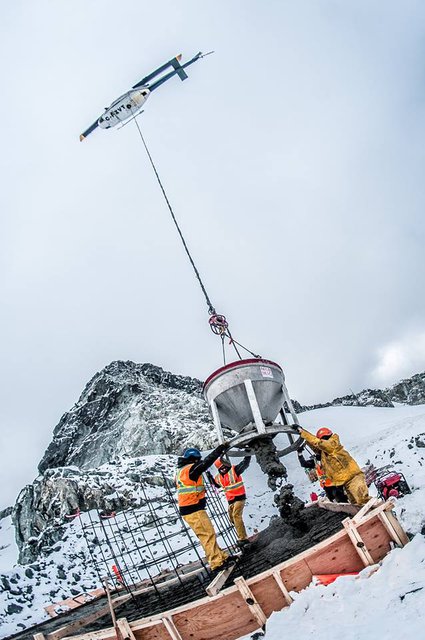
Work began on the glacier as soon as the summer ski season wrapped up in late July. photo William Long
Work began as soon as summer operations wrapped up for the 2015 season but before work could begin on the new snow canons, the showcase t-bar had to be re-positioned to allow space for the new guns. Early September snow made working conditions less then ideal but work is well underway and the first 5 guns will be ready to be blowing snow by the start of the 15/16 season, however these 5 guns are not the end of the project, rather they are just the beginning.
Tom: "So this first season is more of a test for a bigger plan?"
Arthur: "Well we want to verify the production per gun. We know how much on average the glacier loses a season (about 500 000m3) and when we run the numbers a 26 gun system could match those numbers and balance the mass of the glacier, but those are only numbers. We have never put guns so high and in such exposed locations, so we need to get a few guns out there and see what happens."
"Its no different from a wind farm, investors don't suddenly decide to build 20 to 30 wind turbines. You put a weather tower up and study the data. If its appropriate you put one turbine up study it for a year then go from there."
At this time what Whistler have planned is more an experiment to see if a full snow making scheme would be possible. As Arthur mentions snow cannons may prove to be less elective in the more exposed locations on the glacier, so rather then rushing straight ahead with the full plan Whistler are testing to ensure it will actually work. But what does that mean for a time frame, could we end up waiting 5 or 10 years before the full plan is put into place?
Tom: "If the initial studies go well do you have a time frame for how long it would take to get a full 26 gun system in place?"
Arthur: "Well it could be done in a year. If we get very positive results potentially we could put the entire system in next summer. That is best case though and I'm very cautions, we are in the research and development phase right now."
So it would seem we could be seeing a full snow making project very soon if things go well. Arthur had already mentioned that snow making was the only way to prevent further loss but I was interested to know weather techniques used in Europe such as laying plastic sheeting over the glacier to slow melting had been considered. Although not replacing snow they have a much smaller environmental impact when compared to snow making.
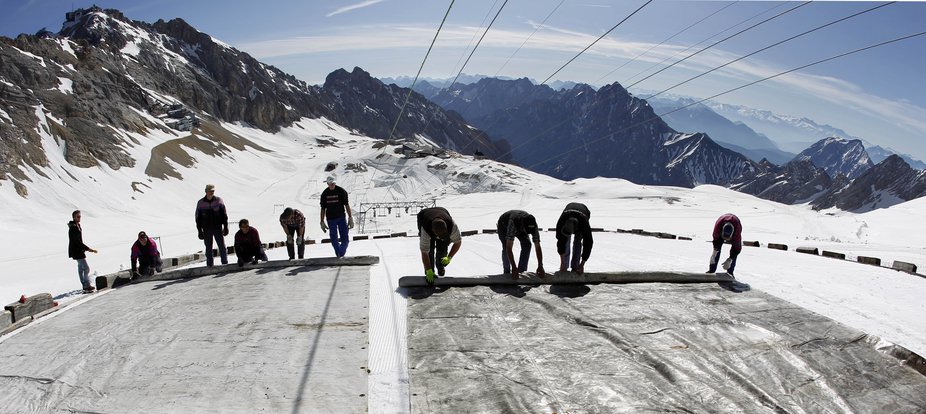
Plastic sheeting is used in some European resorts to try to prevent excessive snow melt during the summer
Tom: "Have you looked at alternative methods such as the plastic sheeting used in Europe?"
Arthur: "It would not work here, its OK in localized locations but implementing it over an entire glacier the size of Horstman would be an impossibility simply from a man power perspective. You would need to remove the covering everyday before skiers arrived and then recover the snow every evening. Another problem is the covering freezes to the ice making the job of removing it even harder. So although it may prevent some melting it would not allow us to continue offering summer skiing."
If you have skied the glacier before you can probably understand the issue. Removing the covering from just the Momentum park for example would take hours so to do it across the entire glacier really would be impractical.
So if snow making really is the best option for slowing the glacier reduction, what would the environmental implications be?
Tom: "Do you feel the power which will be spent to produce the snow will be justified by what you can achieve?"
Arthur: "Its a very good question and this is why we are studying the viability so closely. It's an ethical question as well as a business question and my view on it is that we should only being doing things like this if we are also doing something to deal with the bigger picture and the bigger picture is all about energy."
"It's OK if we have to use more energy on the Horstman glacier provided we are making significant steps in reducing our overall energy footprint. Operations need to adapt, whatever that means. Sometimes adaptation and this is a form of adaption will require more energy but we need to be ever conscious about lowering our overall footprint."
"The perfect situation and i don't at this time have solution, would be if we could have a localized renewable energy system located on the glacier. Maybe with a couple of wind turbines we could potentially match the energy consumption. Closing the energy consumption loop could the final step in this project."
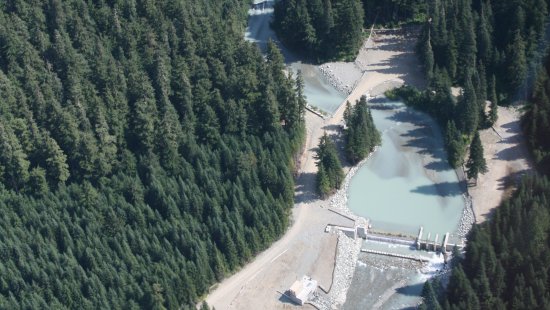
If you have ever ridden the Peak 2 Peak in Whistler you will probably have seen the Hydro Electric plant below. It is renewable energy sources like this which could help Whistler and other resorts lower their overall energy consumption.
Although I'm sure this will not answer all the questions I do think it shows that Whistler are aware that they need to work on being greener across the board. In the coming years I think there will be a few resorts asking themselves these types of questions. If temperatures continue to rise then resorts may become even more reliant on snow making. We may find we are in a situation where we need to use more energy to continue skiing in the same way we do today, but this does not have to be negative. If resorts can offset the extra usage in other ways or even as Arthur suggested find a way to use renewable energy then new projects like this could be the only way to continue skiing as we know it, in the future.
The loss of summer skiing is of course not the only consequence of loosing the glacier. In some places summer melt from glaciers is essential for Hydro Electric production, so I asked Arthur if loosing the glacier could effect whistler in other ways?
Tom: "If the snow making plan on the glacier turned out not to work, could it have implications for the rest of the resort outside of the loss of summer operations?"
Arthur: "Well to the resort not really, i think it's more an indicator of a global issue. Whistler is located in a very water rich zone but in the broader picture only 3% of the earths water is fresh water and only half of that is drinkable. A lot of that drinkable water is stored in glaciers so it is an indicator of great concern for the global water supply. Here in Whistler if the Horstman glacier was gone it would certainly be a loss to our summer program but for example non of our hydro electric is fed via run off from the Horstman so it would not have a huge impact in that respect."
So overall what could all this actually mean? If whistler were able to produce enough snow to offset the loss every year, could this mean they could open the glacier for longer? Could we perhaps see year round skiing in the future?
Tom: "If the testing all works and the system is put in place could it mean a longer summer ski season?"
Arthur: "Well if we just cranked it and it was combined with a period of 2 to 3 seasons of heavy snow like la Nina well ........ But it becomes an economic question and also takes us back to the environmental implications."
"Currently we only want to produce enough to operate the glacier at what we consider a functional level,
that is we have enough lanes that will get you down to the bottom of the t-bars but not one meter further. We are definitely intervening with the glacier, we are farming snow. A farmer would not over fertilize a field or use too much water and we are no different."
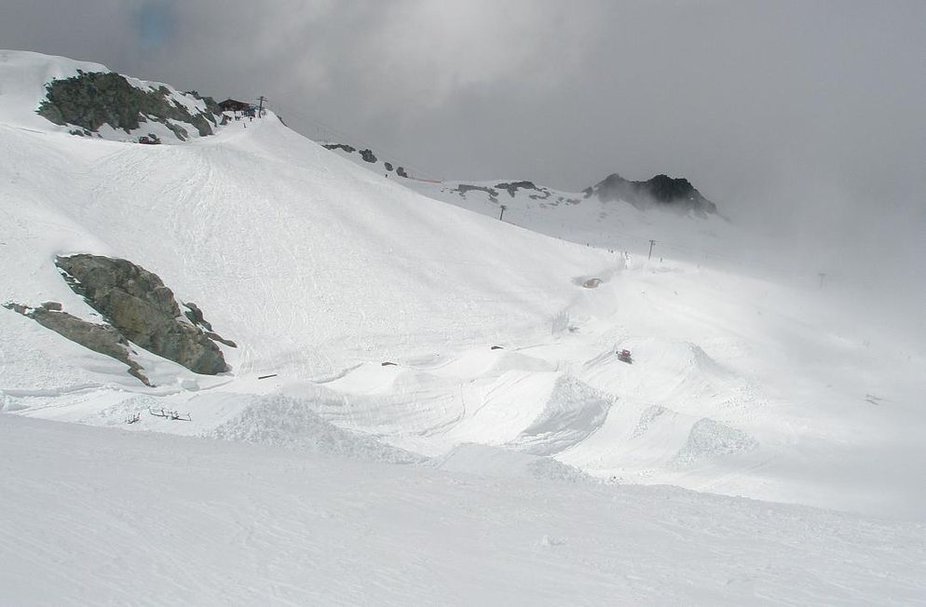
Hopefully we will be back to seeing conditions like these from 2007 again soon. photo Nadia
Although maybe not the response a lot of you wanted, simply having the glacier continue to operate in the future is still a pretty big deal. This is an ambitious project but one that does seem to have been well thought out. Whistler have a history of doing things first and this could very well be the first of potentially many new projects on glaciers around the world.
The purists may resist and say we should not get involved but as a skier, so long as the energy usage is being managed I personally hope the project is a success. Loosing summer skiing completely from North America is a very real possibility so if Whistler can intervene and save summer skiing, I'm all for it.
Thanks to Arthur for taking the time to answer my questions.

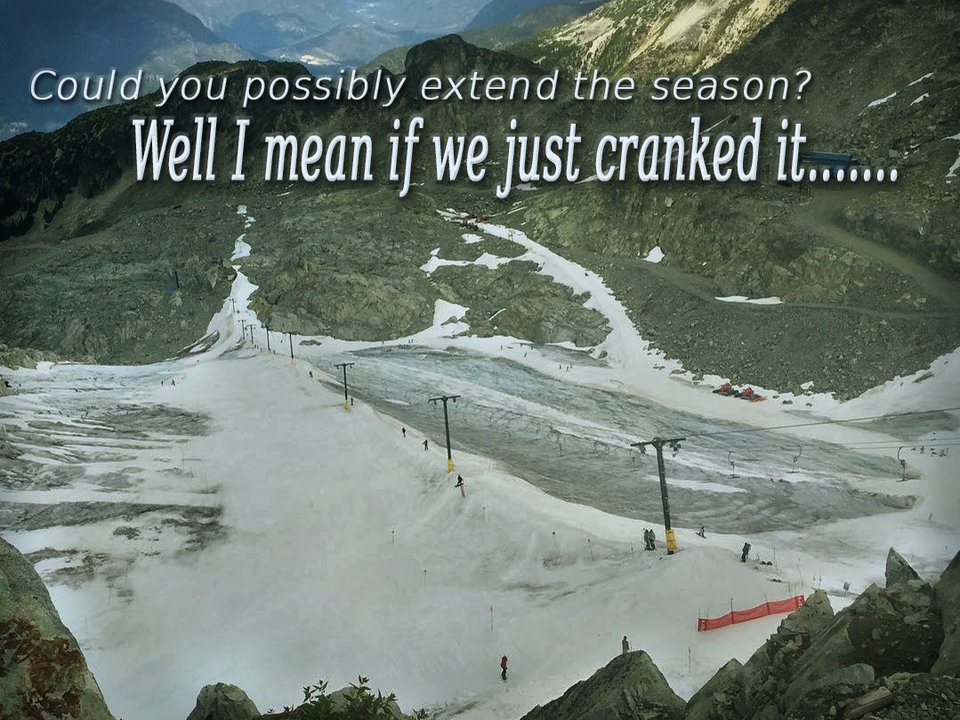
Comments